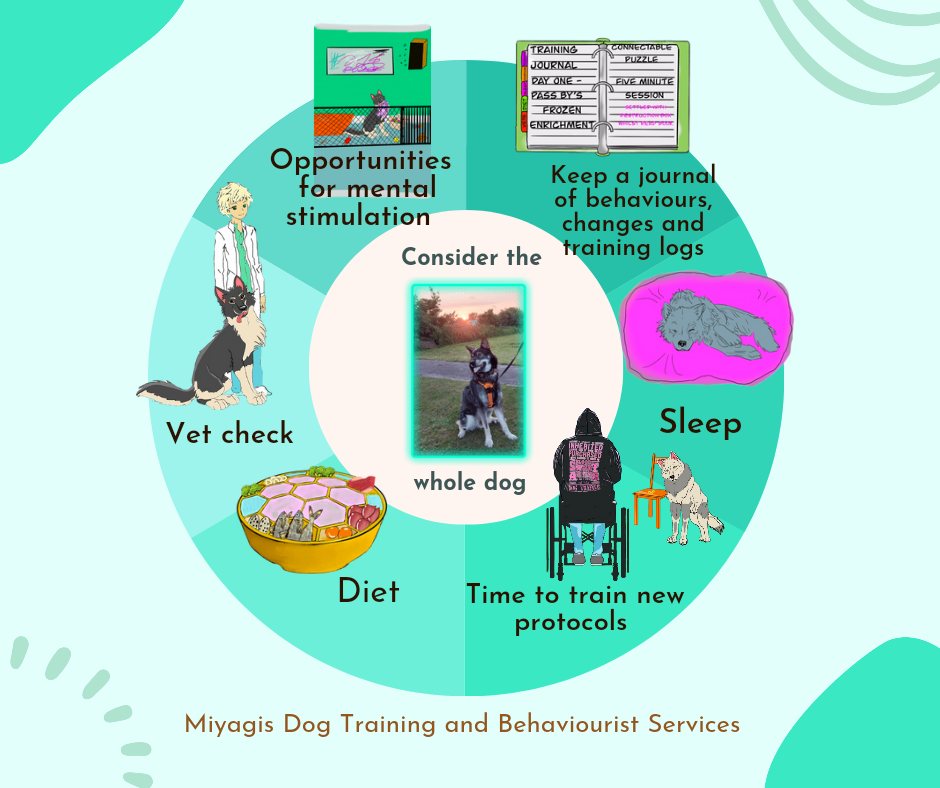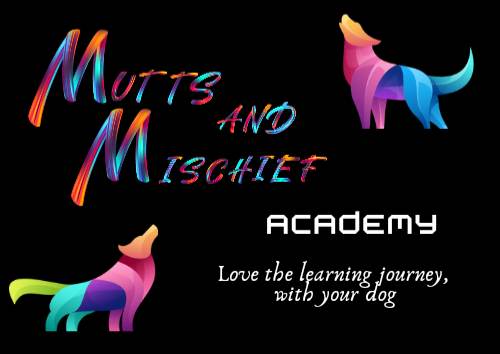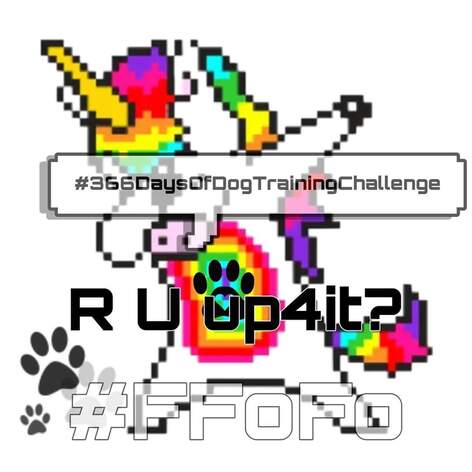|
Caring for our dogs in a holistic way doesn't have to be complicated, for some of you, you may recognise these categories from working with myself or another behaviourist or trainer when filling in history forms and first working together.
This data gathers important information for us to best help you and your dog. So one category at a time, I'm going to explain why each category is so important for your dogs behaviour. There will be an in conclusion and why we do this for the dog holistically as the final blog. This blog to get us started is based on all important sleep! Sleep Using polysomnography, researchers studied dogs for proof of the need for sleep, beyond consolidation of memories and looking further into how sleep can and does affect behaviour in dogs by measuring against a learning task whilst awake with both known and unknown cues such as sits and downs and playing with a Kong for the non learning sessions. Kis, A. Szakadát, S et al. 2017. A polysomnography is simply a sleep study test measuring brain waves, oxygen levels, heart rate and eye movement during sleep. This information is then collected, analysed and interpreted. So now you know how non-invasive measures of sleep are measured in dogs! The results of the studies found that after learning sessions, dogs slept much better and during REM sleep REM stands for rapid eye movement and this is when mammals are in a state of sleep when learning, emotions and healthy brain development is taking place. How exciting! In the invasive procedures used on mice in the past, sadly it was found that the mice couldn't enter REM sleep after they had been subjected to fearful events, which is really important to be mindful of for dogs too. Humans are also the same, we struggle to also enjoy REM sleep when we have had a bad day. Remember in the previous post I mentioned the hippocampus and storage and processing of memories. This is the part of the brain that cannot rest after a stressful or scary event. They also found that testing again after a week that, differential learning took place. Differential learning is when there are no learning constraints, so errors are encouraged in a way as there are no corrections or consequences, getting it wrong. The learner will then try different sequences of behaviours and movements to figure out the behaviour of themselves and learn to perform the skill in different ways. Schollhorn, W. I., Hegen, P., & Davids, K. (2012). An example of this applied to dog training is continuous reinforcement, when we first begin teaching a dog a new behaviour and we continually reinforce them to repeat the desired behaviour and consequently keep rewarding as they try different movements to get the jackpot. The jackpot is known as differential reinforcement which simply means the jackpot reward in dog training. They found that sleep at the sleep study centre for a few hours didn't help learning consolidation, however when the dogs slept at home as normal, memory consolidation did take place and improved learning. Another test was done, again by Kis, A. Gergely, A, et al. 2017. To test this time if sleep in dogs was affected by positive and negative experiences. Many species of animals had previously been studied within these methods, but never dogs. The researchers wanted to understand dogs adapting to living with humans and us now knowing, that dogs recognise human expressions and emotions thanks to An fMRI study of dogs unrestrained. Berns, et al 2012. We also know, even if we don't always want to acknowledge it, that dogs are subjected to lots of social stressors, such as kenneling, separation anxiety, aversives, being relinquished to a shelter, stressful environments (working and non-working) and environmental changes. Dogs are known to have short sleep wake cycles, most active in the morning and nap in the afternoon, unlike other species dogs sleep cycles can be unpredictable due to living with humans. They found that after the dogs had a negative experience that they fell asleep quicker than they did with a positive interaction and that REM (memory consolidation) increased which explains that falling asleep quickly after a negative experience is a protective sleep due to stress. This has been found in humans when sick in response to an altered immune system. The conclusion of the study is that sleep is required for canine welfare in a positive way. So what does this all mean in layman terms, this means that our dogs need sleep and good episodes of deep sleep that isn't interrupted not only to learn and consolidate memories but also to improve behaviour and behaviour can become worse with a lack of sleep and also that dogs need uninterrupted deep sleep for their health and well being. As mentioned in the previous post, when dogs have negative experiences regularly and they don't have sleep to heal they can become ill physically as well as mentally. So how can we help our dogs to sleep? Ensuring that they have opportunity to sleep in low traffic areas of the home, so an area dedicated to the dog where they won't be disturbed, this could be within a Doggy Enrichment Land within the main living area, M. A. Michaels, L 2022 or your own bedroom. Utilising a Doggy Enrichment Land can encourage sleep and utilising enrichment promotes sleep and soothes anxiety and prevents separation anxiety, remember dogs cannot sleep well with a negative experience such as separation anxiety. Dedicating time to sitting down and remaining there for a few hours can really help dog's to settle, sleep and not wake if you do need to pop out of the room, when they are unable to relax and we don't stay put this can further disturb their sleep and prevent good sleep. Whether this be working from home and a Doggy Enrichment Land in the bedroom for night time or sitting down and reading a book, scrolling through social media, which is how you found this blog or watching a Movie or two. Remember my date night for the dogs? If not scroll down, a bit of enrichment, training and a dog movie can go a long way for great sleep results. Sleep is vital, for puppies and dogs with botb positive and negative experiences, try new practices to help your dog to sleep, keep a journal and after a few weeks see if you notice a difference like the researchers. Be your dogs own individual researcher, it's fun and teaches us a lot about our beloved dogs. Kis, A., Szakadát, S., Gácsi, M. et al. The interrelated effect of sleep and learning in dogs (Canis familiaris); an EEG and behavioural study. Sci Rep 7, 41873 (2017). https://doi.org/10.1038/srep41873 Schollhorn, W. I., Hegen, P., & Davids, K. (2012). The nonlinear nature of learning-A differential learning approach. The Open Sports Sciences Journal, 5(1). Berns GS, Brooks AM, Spivak M. Functional MRI in awake unrestrained dogs. PLoS One. 2012;7(5):e38027. doi: 10.1371/journal.pone.0038027. Epub 2012 May 11. PMID: 22606363; PMCID: PMC3350478. M. A. Michaels, L. The Do No Harm Dog Training® and Behavior Handbook: Featuring the Hierarchy of Dog Needs. Image description: a mint green background with a shaded green category circle. Within the categories are sleep, with a grey wolf dog sleeping on a pink bed. A Wheelchair user with their back to the screen playing the chair game with a cream and grey wolfdog with the category title of "Time to train new protocols." A category called "diet" with the sodapup honeycomb slow feeder with raw food in the centre with vegetables, fish, liver and eggs in the outer of the bowl. A Vet with blonde short hair, white medical coat and green scrubs stood with a dark grey and tan Wolfdog with the category "vet check". A category called opportunities for mental enrichment with a dark grey and tan Wolfdog behind an xpen fence, within a Doggy Enrichment Land. A green wall with the bottom of a picture frame and a music speaker. There is a destruction box filled with balls, a Kong, a lickimat, a snuffle mat, an orange bed, a bone, an ostrich twist and a loose ball. The last category is "Keep a journal" with a lined journal with green edges and rainbow dividers.
0 Comments
Leave a Reply. |
BlogFor Mutts & Mischief If you enjoy my blogs and
would like to support my work, you can support me by buying me a Coffee! Archives
July 2024
|
Or are you looking for support and would like to get to know us better?
If the answer is yes then click the image below to join my free facebook group. What is Mutts & Mischief Community?
So it is what it says on the tin! Its a community that is international of Clients and Colleagues with the most supportive and friendly people on the planet. Dog Trainers and Behaviourists from all over the world!
Why did I set up such a mammoth group?
I wanted to have a group exclusively for Clients. For support and to meet uo and build on friendships from Classes or One to Ones. I want Clients to see you are not alone with your Dog and the problem you maybe having that you are not the first and won't be the last! I wanted a safe place where Clients could trade stories good and bad in one place for free!
I also wanted a safe place for the Trainers and Behaviourists I mentor within Social Media Platforms.
Why do this for free?
Because when I say I offer an holistic service I really do. It isn't about the money it is about you and your dogs. You and your dogs are all that matter.
So I wanted to encourage people to do homework and build better quality relationships with their dogs. So 3 years ago I had a mad idea and set up the 100 days of dog training challenge. Once a day people would spend 5 minutes plus training their dog. Recording it and uploading their video onto the Community. Every participant recieved a Certificate.
What I didn't count on was how many Professionals wanted to join and how fast word would spread. So this year 2020 I set up a 366 days of dog training challenge.
We have Clients in America, Greece, Norway, Denmark and Spain. We have Trainers from Greece, Norway, Isle of Wight, America and many more Countries. As well as dog trainers and trainee behaviourists: I mentor all over the world.
So again yes this group is free. It is still primarily for clients and for people to get to know me but we also have the challenge running. Again for free. So if you want to join click the image below to be taken to the group directly. See you there!
So it is what it says on the tin! Its a community that is international of Clients and Colleagues with the most supportive and friendly people on the planet. Dog Trainers and Behaviourists from all over the world!
Why did I set up such a mammoth group?
I wanted to have a group exclusively for Clients. For support and to meet uo and build on friendships from Classes or One to Ones. I want Clients to see you are not alone with your Dog and the problem you maybe having that you are not the first and won't be the last! I wanted a safe place where Clients could trade stories good and bad in one place for free!
I also wanted a safe place for the Trainers and Behaviourists I mentor within Social Media Platforms.
Why do this for free?
Because when I say I offer an holistic service I really do. It isn't about the money it is about you and your dogs. You and your dogs are all that matter.
So I wanted to encourage people to do homework and build better quality relationships with their dogs. So 3 years ago I had a mad idea and set up the 100 days of dog training challenge. Once a day people would spend 5 minutes plus training their dog. Recording it and uploading their video onto the Community. Every participant recieved a Certificate.
What I didn't count on was how many Professionals wanted to join and how fast word would spread. So this year 2020 I set up a 366 days of dog training challenge.
We have Clients in America, Greece, Norway, Denmark and Spain. We have Trainers from Greece, Norway, Isle of Wight, America and many more Countries. As well as dog trainers and trainee behaviourists: I mentor all over the world.
So again yes this group is free. It is still primarily for clients and for people to get to know me but we also have the challenge running. Again for free. So if you want to join click the image below to be taken to the group directly. See you there!
Proudly powered by Weebly



